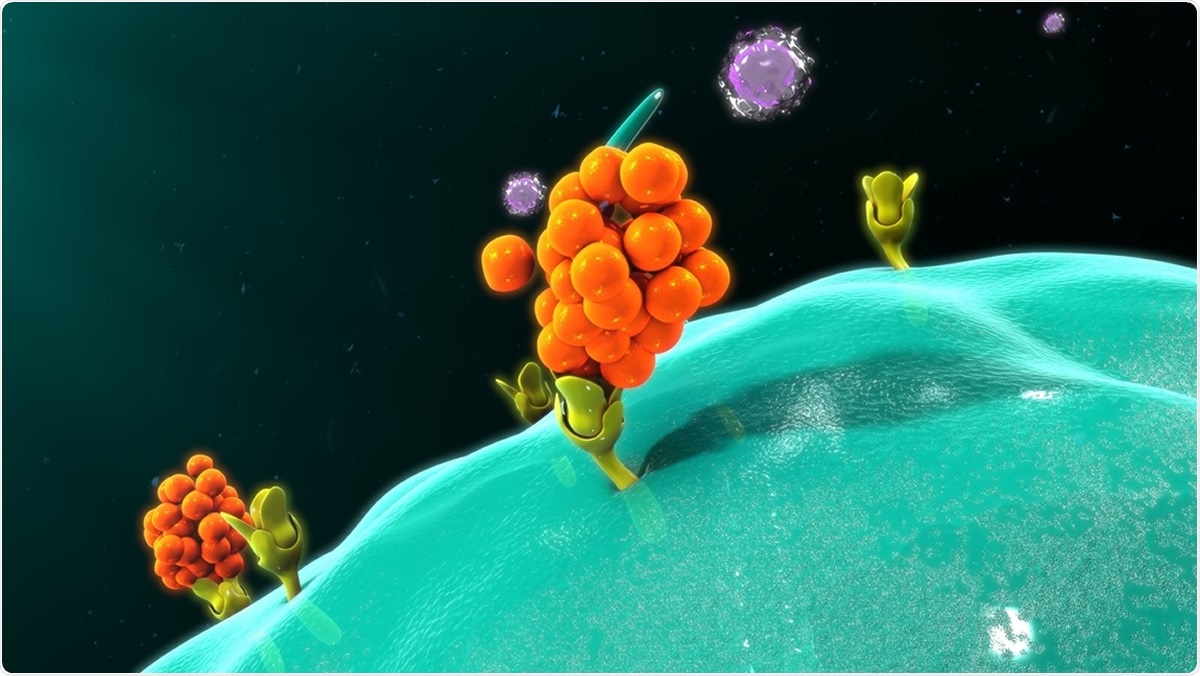Patients infected with the severe acute respiratory syndrome coronavirus 2 (SARS-CoV-2), the virus that causes the coronavirus disease (COVID-19), may develop mild to severe symptoms. In some patients, the infection causes a cytokine storm resulting from a heightened inflammatory response.
What is a cytokine storm?
A cytokine storm syndrome occurs when several medical conditions emerge, and the immune system produces too many inflammatory signals. This syndrome can lead to organ failure and death.
Cytokines are small glycoproteins produced by many types of cells in the body. When these molecules are released, they can trigger body functions, including the control of cell proliferation, endocrine activity, and regulating immune and inflammatory responses.
When there is an infection, various inflammatory cytokines are produced at a much higher rate. These molecules also recruit other immune cells to the site of injury, potentially causing organ damage.
Recently, the cytokine storm has received more attention due to the COVID-19 pandemic. Though health experts and clinicians are learning more each day, cytokine storm seems to be a part of the reason why people develop life-threatening symptoms from COVID-19.

Macrophage releasing cytokines. Image Credit: Sciencepics / Shutterstock

 This news article was a review of a preliminary scientific report that had not undergone peer-review at the time of publication. Since its initial publication, the scientific report has now been peer reviewed and accepted for publication in a Scientific Journal. Links to the preliminary and peer-reviewed reports are available in the Sources section at the bottom of this article. View Sources
This news article was a review of a preliminary scientific report that had not undergone peer-review at the time of publication. Since its initial publication, the scientific report has now been peer reviewed and accepted for publication in a Scientific Journal. Links to the preliminary and peer-reviewed reports are available in the Sources section at the bottom of this article. View Sources
The study
In the study, published on the preprint server bioRxiv*, the researchers said that the heightened inflammatory response results from the assembly and activation of a cell-intrinsic defense platform known as the inflammasome.
The researchers assessed the influence of the SARS-CoV-2 ORF3a, which is thought to be a protein with ion channel activity (viroporin) that activates the NLRP3 inflammasome. ORF3a also plays a role in virus replication and the development of the disease.
Viroporins are a group of proteins that participate in many viral functions, such as promoting the release of viral particles from cells. These proteins also affect cellular functions, including membrane permeability, glycoprotein trafficking, and the cell vesicle system. Though not essential for virus replication, some of these small proteins can generate pores that facilitate ion transport across cell membranes. As a result, they ensure virus release that can activate inflammasomes.
Inflammasomes gather and respond to invading organisms as a component of the innate immune system. Hence, they form the first line of defense against invading pathogens and infection.
With the inflammatory response a contributor to severe illness in COVID-19 patients, it is important to develop therapies that can help block infection and halt virus replication. The team investigated the influence of ORF3a on the inflammatory machinery. They also defined key amino acid residues on ORF3a required to activate the inflammatory response.
What the study found
The team found that the SARS-CoV-2 ORF3a protein primes and activates the inflammasome through the efflux of potassium ions and the kinase NEK7. They also found that though the coronavirus ORF3a protein has separated from its homologs in other coronaviruses, some of the newly divergent residues are crucial for the activation of the NLRP3 inflammasome. Further, they are conserved in virus isolates across continents.
Overall, the team noted that an essential viroporin needed for the release of SARS-CoV-2 from infected cells could also activate the NLRP3 inflammasome.
“ORF3a’s indispensability to the virus’s life cycle makes it an important therapeutic candidate. Moreover, while different from its homologs in other coronaviruses, the high conservation of the newly divergent SARS-CoV-2 ORF3a across isolates from several continents combined with our observation that multiple single point mutations reduce its ability to activate the inflammasome, argues against rapid emergence of resistance phenotypes,” the team explained.
The team also explained that targeting ORF3a may help block virus spread and inflammation. Hence, the study can help in formulating new therapies that can reduce the severe and fatal outcomes of COVID-19 in people who are high risk. These include those who have underlying medical conditions.
“These findings reveal ORF3a and NLRP3 to be attractive targets for therapy,” the team added.
Finding a way to reduce mortality tied to COVID-19 is essential. The number of people infected so far is nearing 45 million, with over 1.18 million lives lost.

 This news article was a review of a preliminary scientific report that had not undergone peer-review at the time of publication. Since its initial publication, the scientific report has now been peer reviewed and accepted for publication in a Scientific Journal. Links to the preliminary and peer-reviewed reports are available in the Sources section at the bottom of this article. View Sources
This news article was a review of a preliminary scientific report that had not undergone peer-review at the time of publication. Since its initial publication, the scientific report has now been peer reviewed and accepted for publication in a Scientific Journal. Links to the preliminary and peer-reviewed reports are available in the Sources section at the bottom of this article. View Sources
Sources:
Journal references:
- Preliminary scientific report.
Xu, H., Chitre, S., Akinyemi, I., Loeb, J. et al. (2020). SARS-CoV-2 viroporin triggers the NLRP3 inflammatory pathway. bioRxiv https://www.biorxiv.org/content/10.1101/2020.10.27.357731v1
- Peer reviewed and published scientific report.
Xu, Huanzhou, Ibukun A. Akinyemi, Siddhi A. Chitre, Julia C. Loeb, John A. Lednicky, Michael T. McIntosh, and Sumita Bhaduri-McIntosh. 2022. “SARS-CoV-2 Viroporin Encoded by ORF3a Triggers the NLRP3 Inflammatory Pathway.” Virology 568 (March): 13–22. https://doi.org/10.1016/j.virol.2022.01.003. https://www.sciencedirect.com/science/article/pii/S0042682222000034.